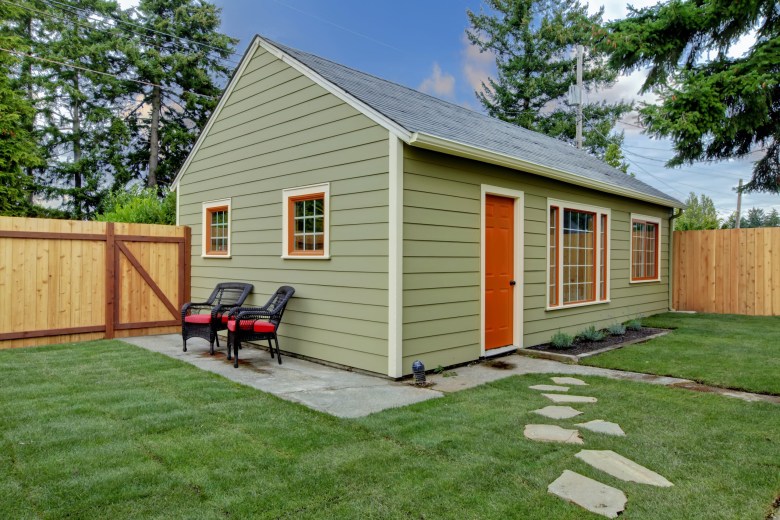At its meeting tonight at 6 p.m., the Little Rock Board of Directors will decide how to comply with a new state law that facilitates the construction of auxiliary dwelling units, or ADUs.
Together, state senator Bart Hester (R-Cave Springs) and state representative Nicole Clowney (D-Fayetteville) sponsored House Bill 1503, which is now Act 313. Proponents claimed the measure would alleviate the state’s housing deficit and provide more options for affordable housing.
The new rule defines ADUs—also known as carriage houses, mother-in-law suites, garage apartments, backyard cottages, etc.—as self-contained, independently accessible living units on the same property as a single-family home with a larger square footage. ADUs must have their own restrooms, kitchens, and sleeping quarters. ADUs may be inside, detached, or attached to an existing single-family home, according to the law.
The new state law prevents Arkansas communities from restricting or outright prohibiting ADUs. For instance, cities cannot mandate that more parking be constructed to serve ADU occupants or that the layout of ADUs be identical to that of the primary residence. According to state law, an ADU may be up to 75% the size of the primary residence on a lot.
The Little Rock ordinance that will be put to a vote on Tuesday serves as a sort of stopgap measure to protect local interests while the process of community involvement is ongoing. According to a website where residents can complete a survey to express their opinions on ADUs, the City is introducing this ordinance to ensure compliance with the recently passed state law, which went into effect on August 5th, and to establish a clear regulatory framework for those seeking to operate under it.
On Wednesday, August 25, at 6 p.m., the Donald W. Reynolds Center for Business and Economic Development will host a community gathering to discuss the survey’s findings.
ADUs cannot be constructed on a lot before a single-family home is located there, according to the ordinance that Little Rock city officials will adopt on Tuesday. It also places a cap of one ADU per single-family home property.
One size fits all?
Frank Scott Jr., the mayor of Little Rock, declared public housing an emergency earlier this year, stating that the city is currently lacking roughly 25,000 units.
Reducing restrictions on ADUs was proposed as a means of increasing the supply of affordable housing during a debate held in the state Capitol this spring. Hester told a Senate hearing that a state statute is necessary since communities are always fighting for affordable housing.
James Walden, the president of the American Planning Association’s Arkansas chapter, brought up a research from Up for Growth during the same subcommittee meeting, stating that as of 2019, there is an undersupply of housing in the state of about 4,500 units.
The state’s northwest region is among the fastest-growing in the country. In Bentonville and Fayetteville, the average price of a home is either over half a million dollars or almost so.
Clowney promoted this bill as an affordable way to address the state’s housing scarcity and provide alternatives for those who are priced out of the conventional housing market. According to her, ADUs reduce the need for further government spending and maximize the utilization of existing infrastructure.
This measure has been marketed by Clowney and Hester as one that will help both renters and property owners. While the latter have a reasonably priced place to live, the former can earn money.
Test cases and limitations
Examples of comparable initiatives from around the nation raise some doubts, despite the fact that they are promoted as a means of increasing the supply of affordable housing options and assisting property owners in accessing a new revenue stream.
Laws that limit the use of ADUs to the immediate family and staff of property owners have been circumvented by wealthy residents in a community in Tampa, Florida. Instead, property owners have been developing AirBNBs.
Additionally, since ADUs are usually constructed in affluent and white neighborhoods, it is unclear what kind of property owners will profit financially from their construction. Poorer homeowners are less likely to be able to afford the investment necessary to benefit from them because building them requires access to finance or credit.
ADUs aren’t always very reasonably priced. ADUs were selling for market rates and higher in San Diego, where they were promoted as an affordable housing choice.
City Attorney Tom Carpenters stated during a meeting on July 12 that one issue is the new state ADU law’s ambiguous wording. The second issue, according to him, is that the statute has a clause that says any restrictions the city has in place that are more stringent than the new state law expire on January 1, 2026.
The city amended its own code to state that an ADU cannot be constructed or occupied prior to the building of a principal single-family home, unless the planning director of the city grants permission for temporary use while construction is underway.
According to Carpenter, there is no requirement under the state legislation that the main structure must be present first, and if we demand an auxiliary construction to have greater restrictions than what we permit for other structures in the city, we will be in direct violation of the language.
Director BJ Wyrick voiced concerns that instead of ADUs, duplexes would be constructed on residential sites. Along Mountain Vista Drive, she claimed, it was already taking place. She claimed that state lawmakers informed her that the goal was not to promote the construction of duplexes.
Virgil Miller, the city director, told the Arkansas TimesHe hopes to learn more before the vote because he didn’t completely comprehend the state law’s nuances.
Lance Hinessaid, the city director, agreed with Wyrick and supports the need that an existing structure be present before constructing an ADU because, according to him, some people have been attempting to construct both at the same time. Additionally, he stated that the matter will be better recognized at the conference and that Carpenter’s view of the law might differ from that of other communities.
It’s dragon-slaying time!
The Arkansas Times, which relentlessly defends the fundamental rights and liberties in our community, stands as a light of truth in an era when critical voices are being silenced more and more. Our commitment to provide uncompromising journalism has never been more important, especially with Arkansas in the center of a broad culture war that is impacting our libraries, schools, and public conversation. We can’t accomplish our goals of defeating dragons and holding those in positions of authority responsible alone. You can guarantee that independent journalism in Arkansas not only endures but flourishes by making a contribution today. We can join the fight and make a difference together.







